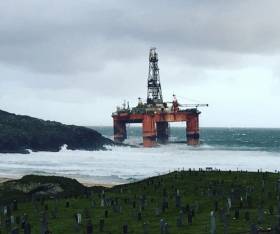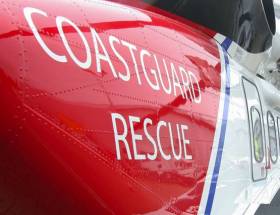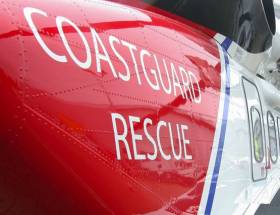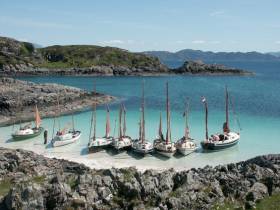Displaying items by tag: Scotland
Oil Rig Runs Aground In Outer Hebrides
#OilRig - BBC News reports that a 17,000-tonne oil rig has run aground at Scotland's Outer Hebrides after storm-force winds battered the area on Monday (8 August).
The drilling platform Transocean Winner was under tow when it was blown onto the beach at Dalmore in the north of the Isle of Lewis in Scotland's Western Isles, more than 300km north of Malin Head.
No personnel were on board the rig at the time, but due to the presence of significant quantities of diesel on board, the Maritime and Coastguard Agency is keeping watch for any potential pollution hazard.
BBC News has much more on the story HERE.
Five Rescued From Sinking Boat Off Scottish Coast
#Coastguard - Five people were rescued as their boat sank under them between Ailsa Craig and Girvan in the Firth of Clyde last night (Saturday 6 August).
Belfast Coastguard received 999 calls just after 6.40pm from the men on the small boat, reporting they were sinking but only an approximate location on the coast.
The coastguard rescue helicopter from Prestwick and Girvan Coastguard Rescue Team were sent to search, while Girvan and Campbeltown RNLI lifeboats were requested.
Coastguard co-ordinators at Belfast also received help from the Irish Coast Guard, who tracked a precise location for the position of the casualty’s mobile phone.
The coastguard helicopter arrived on scene and prioritised winching two people from the vessel who weren’t wearing life jackets.
At this point the vessel sank in rough water, and the three others were rescued from the water and winched into the helicopter.
The five men were landed nearby and met by Girvan Coastguard Rescue Team, who found them to be safe and uninjured.
#Search - Two bodies have been found in the search for the missing crew of a fishing vessel that sank off Scotland's Western Isles early yesterday (Saturday 9 April).
One crew member was taken to hospital by helicopter as UK Coastguard teams from Stornaway and Prestwick joined the Barra RNLI lifeboat, local fishing vessels and Police Scotland in the search and rescue operation for three missing crewmates, as previously reported on Afloat.ie.
One fisherman remains missing after two bodies were recovered yesterday afternoon off Mingulay. Next of kin are aware and police officers are in contact with the families.
Mark Rodaway, national maritime operations commander for the UK Coastguard, said: “Despite an intensive search including the helicopters, lifeboat and other fishing vessels in the area, we have been unable to locate the missing fisherman. Our thoughts are with all those involved.”
Chief Inspector Alastair Garrow of Police Scotland said: "At this time we can confirm that the bodies of two men have been recovered. A third man was rescued and was taken to hospital at Stornoway. He is not seriously injured.
"A fourth man was on the boat and is still missing. The next of kin of all the men have been informed.
Chief Insp Garrow added: "An investigation will be carried out in parallel with the police and the Marine Accident and Investigation Branch (MAIB) and a report will be submitted to the Procurator Fiscal.
"This has been a tragic incident which will impact on the local community. Our thoughts are with the families affected."
The search has now been scaled back pending further information.
#Search - One crew member from a fishing vessel has been rescued as the search continues for three others after the boat sank off Scotland's Western Isles in the early hours of this morning (Saturday 9 April).
The UK Coastguard received a distress alert just before 3:45am when the fishing vessel with four crew on board has its emergency positioning beacon (EPIRB) activated near Mingulay.
The coastguard search and rescue helicopter based at Stornoway has since been searching the area along with the Barra RNLI lifeboat.
One crew member has been taken to hospital by the helicopter. The lifeboat remains in the area and the coastguard helicopter from Prestwick has taken over so the search can continue.
Scottish Economy Benefits From Marine Tourism Billions
#Tourism - A new report from the Scottish government says the marine tourism sector is worth £3.7 billion (€4.7 billion) annually.
And more than a third of that spend is on water-based activities from sailing and surfing to kayaking, angling and marine wildlife watching, according to BBC News.
Businesses in the sector who contributed to the Scottish Marine Recreation and Tourism Survey say they are optimistic about growth over the next five years, coinciding with the industry's five-year action plan as previously reported on Afloat.ie.
As such, the Irish marine sector will be watching with interest to see how Scotland's strategy could inspire a boost in this country's burgeoning aquatic tourism industry – much in the same way Ireland's sailing tourism sector inspired the Scots five years ago.
BBC News has more on the story HERE.
Report On Trawler Sinking Prompts Call For Safety Basics On Emergency Pumps, Helicopter Rescues
#MCIB - Protocols for SAR helicopter rescues and the use of emergency portable pumps should be included in safety training for fishing vessels.
Those were among the recommendations from the Marine Casualty Investigation Board's (MCIB) report on the sinking of the trawler Iúda Naofa off Scotland a year ago.
As previously reported on Afloat.ie, the Aran Islands registered trawler sank suddenly off the Outer Hebrides on 20 January 2015 after it began taking on water.
The boat's five crew were rescued immediately by an accompanying vessel and the UK coastguard, and none required medical attention, according to the MCIB.
But the board's report into the incident highlighted the lack of knowhow regarding hi-line protocols for helicopter operations among the crew, with only one fisherman on board having any prior knowledge.
As a result the crew were unable to release the emergency pump dropped from the helicopter from its standard clasp, nor determine how to operate it despite the instructions being included – though in this particular situation the flooding was too great for the pump to be of use.
The MCIB was unable to determine the cause of the water ingress without physical evidence from the trawler, which could not be recovered.
It was noted that the vessel had adequate stability for normal working conditions, and that the crew made every effort to save the vessel – but were hampered by flooding in the compartment with the pumps and generators, which rendered them useless.
Also noted was that the while the crew were not all wearing lifejackets or fully zipped up in survival suits, after expressing difficulty working on rescuing their boat with them on, they evacuated the vessel without panic and looked after each other.
The release of the report coincides with a new campaign by Bord Iascaigh Mhara (BIM) to encourage all in the fishing industry to wear personal flotation devices – or PFDs – where appropriate, according to The Irish Times.
BIM's statistics show that more than half of all fishermen in Ireland do not wear a lifejacket or PFD while at sea, despite the availability of free safety gear on subsidised training courses.
It's also despite 36% of fishermen reporting that the know of a colleague who has died at sea.
The Irish Times has much more on the story HERE.
#MarineWildlife - The killer whale found beached on a Scottish island last weekend likely died after getting entangled in fishing gear for days, say experts.
As previously reported on Afloat.ie, the orca known as Lulu to researchers, who have been tracking her unique pod since the early 1990s, was discovered on the island of Tiree in the Inner Hebrides last Sunday 3 January.
Lulu's "evolutionary significant" group has been under threat for years due to the absence of calves among its number since scientists began monitoring them around the Scottish and north Irish coasts.
But according to The Press and Journal, Lulu's death was not down to natural causes – with a post-mortem report from experts at the Scottish Marine Animal Strandings Scheme claiming "convincing evidence that she had become chronically entangled" in fishing gear, with deep wounds consistent with a rope wrapping around her tail.
“There were no ropes or gear left on the carcass," said the scientists in a statement. "We’re assuming all this from the lesions we found on her body, so we don’t know if this was due to active fishing gear, abandoned or ‘ghost’ gear, or other marine debris."
The Press and Journal has much more on the story HERE.
Unique Scottish Orca Pod Loses Another Member
#MarineWildlife - One of the last remaining members of a unique pod of killer whales has been found dead on a Scottish island.
As STV News reports, the orca known as Lulu to marine researchers was found beached on the island of Tiree in the Inner Hebrides on Scotland's west coast on Sunday 3 January.
Like John Doe, who is believed to have survived an altercation with a shark a year ago, Lulu was one of a familiar family of orcas that's regularly seen off Scotland and even as far west as the Donegal coast.
It's a pod that's piqued the interest of marine science due to its genetic distinctiveness from other orcas in the North Atlantic, as previously reported on Afloat.ie.
But the "evolutionary significant" group's numbers have been dwindling in recent years due to the absence of calves since scientists started tracking them more than two decades ago.
"It is particularly sad to know that another one of these killer whales, unique to the British and Irish Isles, has died," said the Hebridean Whale and Dolphin Trust. "There may be as few as eight individuals remaining in this population."
STV News has more on the story HERE.
Hunt For 'Russian Submarine' Spotted Off Scottish Coast
#Submarine - RAF aircraft have been joined by French and Canadian counterparts as well as a Royal Navy frigate in the search for a Russian submarine reported to have been seen off the Scottish coast.
According to The Scotsman, it's believed the search has been ongoing for more than a week after a vessel was detected north of Scotland, though the UK's Ministry of Defence would neither confirm nor deny such a search was taking place.
The news comes some three months after a Donegal crab boat reported a near-miss with a submarine off Tory Island on Ireland's North Coast.
It's not known what country's military that submarine represented, but it is feared that Russian subs might be secretly surveying undersea internet cables for potential strategic advantage.
However, searches for such rogue submarines have been blamed by environmentalists for prompting significant whale strandings, as reported on Afloat.ie earlier this year.
The Scotsman has more on the story HERE.
Can Ireland Learn From Scotland's Plans For Marine Tourism Growth?
#Tourism - Ireland is lagging behind our Scottish neighbours when it comes to strategy for growing marine tourism.
That's according to Dun Laoghaire Marina, which today (Friday 20 November) tweeted on the impending announcement in Edinburgh of a five-year action plan to grow Scotland's marine tourism industry by £90 million (€128.7 million).
Connected with that are moves to boost sailing tourism by nearly 50% of its current £100 million value to the Scottish economy, as STV News reports.
"Providing authentic experiences, improving the customer journey and building industry capabilities" are the three themes identified in the Scottish plan to develop both infrastructure and facilities for coastal and waterway attractions, and events and initiatives highlighting the same.
While local strategies are being devised in Ireland, such as Galway City Council's recent six-year tourism blueprint to take advantage of the successful Wild Atlantic Way initiative, Dun Laoghaire Marina laments that there is nothing in this country comparable to Scotland's national plan, nor the Scottish Parliament's Cross-Party Group on Recreational Boating and Marine Tourism.
That's despite the focus on the marine sector and the 'blue economy' championed at this summer's second Ocean Wealth Conference.
What do you think? Does Ireland need a clearer roadmap towards making the most of our marine resources for tourism? Let us know in the comments below

































































